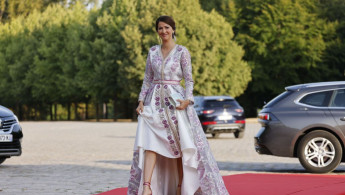Former French-Moroccan Charlie Hebdo journalist loses prize over anti-Israel post
Former Charlie Hebdo Franco-Moroccan journalist Zineb El Rhazoui had her Simone Veil Prize revoked following a retweet drawing parallels between the Holocaust and Israel's current offensive in the Gaza Strip.
"I will give you back your Siomen Veil Prize because it became tainted with blood," wrote the journalist and former Nobel Prize nominee after revoking her prize.
On 9 December, Rhazoui reposted with no comment a thread originally published by journalist Benjamin Rubinstein on the X social media platform comparing the unfolding Israeli war on Gaza to Nazi Germany's holocaust.
Rhazoui's post soon triggered controversy and criticism from French public figures, including Aurélien Veil, the grandson of Simone Veille, the late feminist, politician and Holocaust survivor.
Bonjour Madame @vpecresse.
— Aurélien Veil (@AurelienVeil) December 9, 2023
Il y a quatre ans, la région Ile-de-France a remis à Madame @ZinebElRhazoui un prix portant le nom de ma grand-mère Simone Veil.
Ma grand-mère qui a passé plusieurs mois, d'avril 1944 à janvier 1945, à survivre dans le camp d'Auschwitz-Birkenau, pic.twitter.com/E03LYqLpZS
"Each person is free to have their own ideas and make their own statements, and Madame El-Rhazoui is no exception. However, I cannot help but express my concern and dismay at seeing that my grandmother's name is associated with the trivialisation endeavour that (El Rhazoui ) explicitly stated," wrote Aurélien Veil in a long thread explaining his mother's struggle in the European holocaust.
The Île-de-France Region awards the Simone Veil Prize each year to a particularly deserving woman from the region who embodies the legacy of Simone Veil.
In the same thread, Aurélien called on Valerie Pecresse, the mayor of Île-de-France, to revoke Rhazoui's Veil prize, which she won in 2019.
In her defence, the French Moroccan journalist Rhazoui released a public statement clarifying her position on the Gaza war and addressing the controversy.
Bonjour Monsieur @AurelienVeil
— Zineb El Rhazoui (@ZinebElRhazoui) December 9, 2023
Il y a 4 ans, j’ai eu l’honneur de recevoir des mains de Madame @vpecresse le prix Simone Veil des Trophées Elles de France, prix du public qui a très largement voté pour qu’il me soit attribué.
Pour moi, l’enseignement de Simone Veil, c’est que… https://t.co/wRIznzKNCl
"For me, the lesson from Simone Veil is that humanism always takes precedence over tribalism or politics. If the Simone Veil Prize means remaining silent in the face of the internationally condemned criminal actions of Netanyahu's far-right government, I would be very happy to return it," she wrote, among other things.
Rhazoui also called for denouncing all violence committed against civilians by armed organisations, militias or regular armies.
However, Rhazoui's arguments did not convince the right politician and mayor Valérie Pécresse.
On 10 December, Pécresse answered Simone Veil's grandson's request. She deemed Rhazoui's post "outrageous and shocking" in a press statement detailing the reasons behind revoking the journalist's prize.
Pourquoi j’ai decidé, en accord avec les ayant droits de Simone Veil, de retirer, au nom de la Région @iledefrance, le prix Simone Veil à Zineb El Rhazoui. ⤵️ pic.twitter.com/rv78OpeyfX
— Valérie Pécresse (@vpecresse) December 10, 2023
Pécresse is known for her controversial decisions. In July, she ordered changing the name of a high school from Angela Davis to Rosa Parks. According to Pécresse, Angela Davis as a figure "does not represent the values of the French Republic."
Rhazoui's controversy led to a broader discourse about the double standards regarding freedom of speech in France.
Several commentators on social media pointed out that the former Charlie Hebdo journalist has been celebrated for her public criticism of Islam and Islamist movements throughout her career, yet she lost all the endorsement the moment she stood for Palestine.
"When Zineb El Rhazoui criticised Islam, she was liked a lot, even too much, in France. But when she started denouncing the genocide in Gaza committed by the extremist and exterminating Israeli government, the same people who were applauding her just yesterday began to insult her," wrote Ali Mrabet, a Spain-based journalist, on X.





 Follow the Middle East's top stories in English at The New Arab on Google News
Follow the Middle East's top stories in English at The New Arab on Google News


